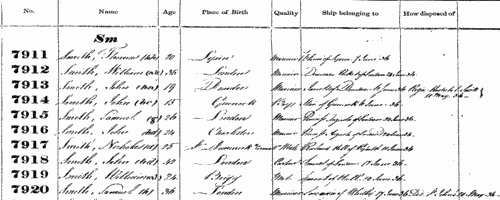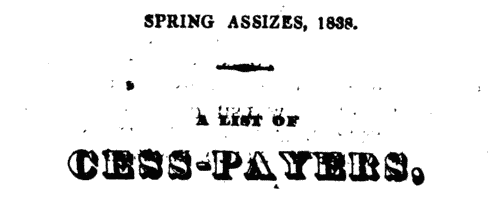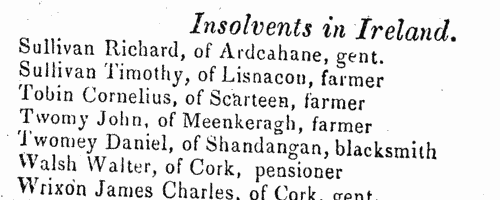Keeffe Surname Ancestry ResultsOur indexes 1000-1999 include entries for the spelling 'keeffe'. In the period you have requested, we have the following 92 records (displaying 1 to 10): Single Surname Subscription | | | Buying all 92 results of this search individually would cost £560.00. But you can have free access to all 92 records for a year, to view, to save and print, for £100. Save £460.00. More... |
These sample scans are from the original record. You will get scans of the full pages or articles where the surname you searched for has been found. Your web browser may prevent the sample windows from opening; in this case please change your browser settings to allow pop-up windows from this site.  Apprentices and clerks
(1802) Apprentices and clerks
(1802)
Apprenticeship indentures and clerks' articles were subject to a 6d or 12d per pound stamp duty: the registers of the payments usually give the master's trade, address, and occupation, and the apprentice's name, as well as details of the date and length of the apprenticeship. 2 January to 2 June 1802. IR 1/38KEEFFE. Cost: £8.00.  | Sample scan, click to enlarge

| Irish Insolvents
(1827)
Insolvency notices for Ireland: insolvency often caused people to restart their lives elsewhere, so these are an important source for lost links, especially for emigrantsKEEFFE. Cost: £6.00.  | Sample scan, click to enlarge

| Merchants and Traders in Dublin (1830)
Wilson's Dublin Directory for the year 1830 lists merchants and traders alphabetically by surname, with christian name or initials, trade, and (in italics) address.
KEEFFE. Cost: £8.00.  | Sample scan, click to enlarge

|  British merchant seamen
(1835-1836) British merchant seamen
(1835-1836)
At this period, the foreign trade of ships plying to and from the British isles involved about 150,000 men on 15,000 ships; and the coasting trade about a quarter as many more. A large proportion of the seamen on these ships were British subjects, and so liable to be pressed for service in the Royal Navy; but there was no general register by which to identify them, so in 1835 parliament passed a Merchant Seamen's Registration Bill. Under this act this large register of British seamen was compiled, based on ships' crew lists gathered in British and Irish ports, and passed up to the registry in London. Each seaman was assigned a number, and the names were arranged in the register by first two letters of the surname (our sample scan shows one of the pages for 'Sm'); in addition, an attempt was made to separate out namesakes by giving the first instance of a name (a), the second (b), and so on. But no effective method was devised to prevent the same man being registered twice as he appeared in a second crew list; moreover, the original crew lists were clearly difficult for the registry clerks to copy, and some of the surname spellings appear to be corrupted. A parliamentary committee decided that the system devised did not answer the original problem, and this register was abandoned after less than two years: but it is an apparently comprehensive source for British merchant seamen in 1835 to 1836. The register records the number assigned to each man; his name; age; birthplace; quality (master, captain, mate, 2nd mate, mariner, seaman, fisherman, cook, carpenter, boy &c.); and the name and home port of his ship, with the date of the crew list (usually at the end of a voyage). Most of the men recorded were born in the British Isles, but not all (for instance, Charleston and Stockholm appear in the sample scan). The final column 'How disposed of' is rarely used, and indicates those instances where a man died, was discharged, or deserted his ship during the voyage.KEEFFE. Cost: £8.00.  | Sample scan, click to enlarge

| Irish Insolvents
(1838)
Insolvency notices for Ireland: insolvency often caused people to restart their lives elsewhere, so these are an important source for lost links, especially for emigrantsKEEFFE. Cost: £6.00.  | Sample scan, click to enlarge

| Kilkenny Cess Payers: Gowran Barony
(1838)
Panels of twelve cess-payers were chosen from each of the ten baronies of county Kilkenny, to be associated with the justices at special sessions, under 6 & 7 William IV cap. 116. Spring Assizes, 1838.KEEFFE. Cost: £6.00.  | Sample scan, click to enlarge

| Irish Insolvents
(1840)
Insolvency notices for Ireland: insolvency often caused people to restart their lives elsewhere, so these are an important source for lost linksKEEFFE. Cost: £6.00.  | Sample scan, click to enlarge

| County Cork Freeholders: Booth No 1
(1841)
The poll books of voters in the parliamentary election for county Cork 13 to 15 July 1841 delivered in to the select committee that subsequently looked into the propriety of the proceedings, and then annotated with observations as to those votes to which objection had been raised. There are separate books for seven booths, with the electors' names in order of voting: giving each freeholder's full name, place of abode, situation of the freehold, value, number and date in the alphabetical registry book, and for which candidates they voted (Daniel O'Connell, Edmund Burke Roche, Nicholas Philpot Leader, and Robert Longfield). The seven booths are for these areas: 1. Duhallow barony; 2. Hall County Side, East East Carbery, West East Carbery and East West Carbery; 3. Barrymore and West West Carbery; 4. Condons and Fermoy; 5. Imokelly and West Muskerry.KEEFFE. Cost: £6.00.  | Sample scan, click to enlarge

| County Cork Freeholders: Booth No 3
(1841)
The poll books of voters in the parliamentary election for county Cork 13 to 15 July 1841 delivered in to the select committee that subsequently looked into the propriety of the proceedings, and then annotated with observations as to those votes to which objection had been raised. There are separate books for seven booths, with the electors' names in order of voting: giving each freeholder's full name, place of abode, situation of the freehold, value, number and date in the alphabetical registry book, and for which candidates they voted (Daniel O'Connell, Edmund Burke Roche, Nicholas Philpot Leader, and Robert Longfield). The seven booths are for these areas: 1. Duhallow barony; 2. Hall County Side, East East Carbery, West East Carbery and East West Carbery; 3. Barrymore and West West Carbery; 4. Condons and Fermoy; 5. Imokelly and West Muskerry.KEEFFE. Cost: £6.00.  | Sample scan, click to enlarge

| County Cork Freeholders: Booth No 4
(1841)
The poll books of voters in the parliamentary election for county Cork 13 to 15 July 1841 delivered in to the select committee that subsequently looked into the propriety of the proceedings, and then annotated with observations as to those votes to which objection had been raised. There are separate books for seven booths, with the electors' names in order of voting: giving each freeholder's full name, place of abode, situation of the freehold, value, number and date in the alphabetical registry book, and for which candidates they voted (Daniel O'Connell, Edmund Burke Roche, Nicholas Philpot Leader, and Robert Longfield). The seven booths are for these areas: 1. Duhallow barony; 2. Hall County Side, East East Carbery, West East Carbery and East West Carbery; 3. Barrymore and West West Carbery; 4. Condons and Fermoy; 5. Imokelly and West Muskerry.KEEFFE. Cost: £6.00.  | Sample scan, click to enlarge

|
Research your ancestry, family history, genealogy and one-name study by direct access to original records and archives indexed by surname.
|













